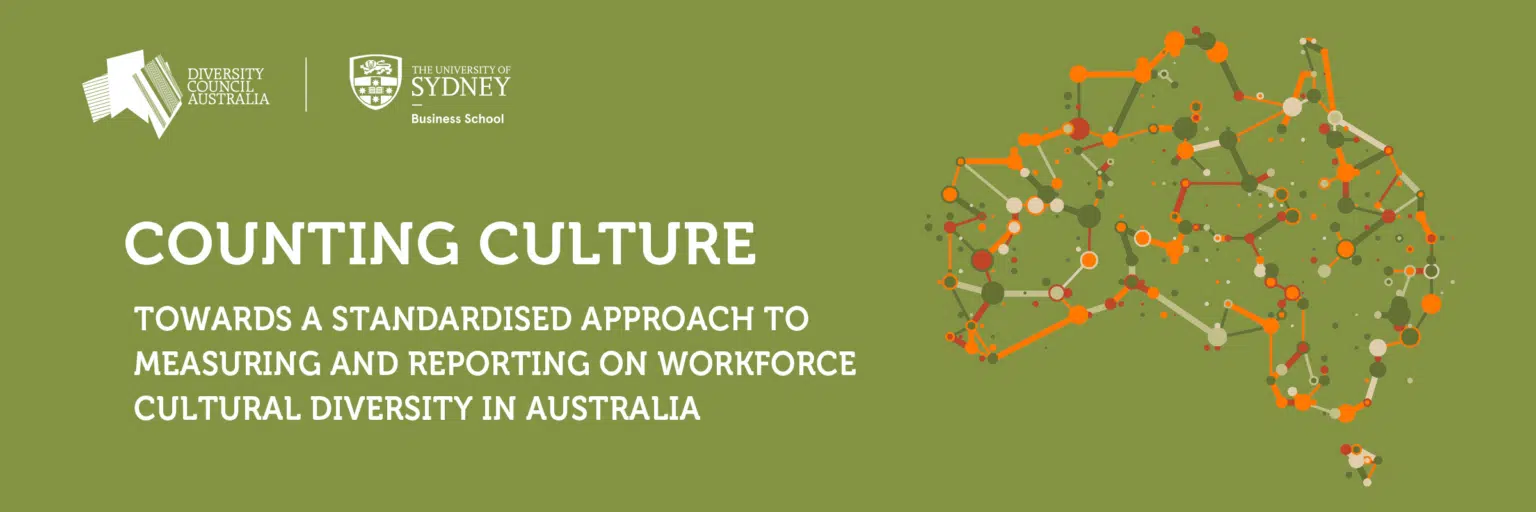
Research from Diversity Council Australia (DCA) and the University of Sydney Business School has developed a standardised approach for defining, measuring, and reporting on workforce cultural diversity in a respectful, accurate and inclusive way.
Until now, Australian organisations have been missing out on important business opportunities by failing to effectively measure the degree and breadth of culturally diverse talent in their leadership team, workforce, customer base, and labour market pool.
This report, Counting Culture: Towards A Standardised Approach to Measuring and Reporting on Workforce Cultural Diversity in Australia, guides businesses through how best to count cultural background, language, religion – and even global experience – for maximum organisational benefit. Critical in a country where the Australian Bureau of Statistics reports nearly half (49 per cent) of Australians have been born overseas, have one or both parents born overseas, where over 300 languages are spoken at home, and where more than 300 ancestries are identified with.
A practical approach
The Counting Culture Approach was designed to be practical for employers (even if they had limited in-house resources and expertise to count cultural diversity) and inclusive for employees (i.e., experienced as respectful and meaningful).
The report recommends organisations use three Core Measures, supplemented where space and resources allow by two Additional Measures.
In all, there are 5 Measures listed in order of priority so that if, your organisation only has space to ask 2 questions on cultural diversity, we suggest these be Measures 1 and 2.
But the report also notes that when starting to count cultural diversity, organisations should first include a stand-alone question about workers Aboriginal and/or Torres Strait Islander background. This emphasises the centrality of Indigenous issues to any diversity and inclusion work. Importantly, it also enables employees who identify as, for instance, being Aboriginal and as having a Chinese cultural background to not have to choose between indicating they are ‘Australian Aboriginal’ or ‘Chinese’.
This research drew on several key sources of evidence, including a literature review, a consultation survey, eight think tanks, a pilot survey and expert panel consultations with experts immersed in the field in industry, government, and academia.
DCA partnered with the University of Sydney Business School, foundation sponsor City of Sydney and supporting sponsor ASIC, to undertake this project.
Thank you to the hundreds of people from a rich diversity of cultural backgrounds who generously contributed their insights to the report, and we hope the recommendations will do justice to your experiences.
Want to use our research?
Materials contained in this document are © Copyright of DCA Ltd and University of Sydney Business School, 2021 and come under our Terms of Use and Privacy Statement. If you wish to use any content contained in this report, please contact DCA at research@dca.org.au, to seek consent.
Where you wish to refer to our research publicly, it must be correctly attributed to DCA.
- Formal attribution to DCA is required where references to DCA research material are in a written format.
- Citing DCA and University of Sydney Business School as a source will suffice where the reference is made in a verbal format.
Suggested citation: Diversity Council Australia/University of Sydney Business School (R. DAlmada- Remedios, D. Groutsis, A. Kaabel, and J. OLeary) Counting Culture: Towards a Standardised Approach to Measuring and Reporting on Workforce Cultural Diversity in Australia, Sydney, Diversity Council Australia, 2021.
To request an accessible alternative format of any document, please email admin@dca.org.au. Please let us know which format you need and for which document. While DCA will do its best to provide you with the alternative you need, please be aware that not all formats may be available.
Member-only content
Gain full access with DCA membership!
If your organisation has just signed up, your access will be activated as soon as payment is received.
